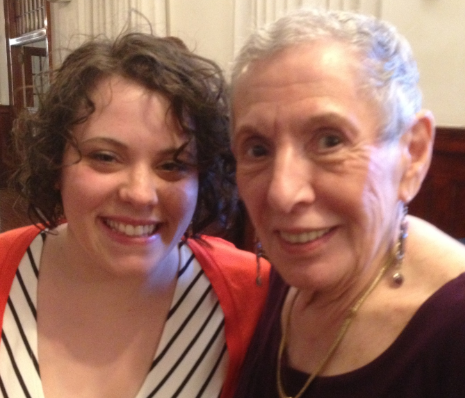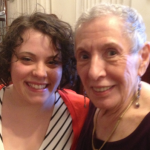I have a pretty cool grandmother. She is more current on culture than almost anyone I know, seeing every new film release before I have, always having an opinion on every political event as it happens. When Mad Men premiered in 2007 to widespread critical acclaim, I naturally asked my grandmother if she was watching. Her response: “I don’t need to watch it. I lived it.”
September 7 is National Grandparent’s Day, and thanks to the American Grandparents Association and the National Women’s Law Center, I was given the special opportunity to interview my grandmother about what it was like to be a working woman in America in the 1950s — what it truly meant to “live” Mad Men.
My grandmother (or as I call her, my “Mama”) has always been a trailblazer. I grew up with stories of the 12-year old girl who was the first to be bat mitzvahed in her Orthodox synagogue in the Bronx, New York in 1944. She received a college degree and worked until she was 28, far past her contemporaries. I’ve always known her as my fearless, fierce grandmother; but until recently, all I knew of that working life were horror stories of riding the New York City subway with no air conditioning in a wool suit.
My grandmother’s story sounds eerily similar to one Christina Hendricks’ character, Joan, might tell: she worked as an executive secretary at television production companies, diamond sellers and Madison Avenue advertising agencies, seated right outside her boss’s office (and ever the pioneer, eventually as a print media buyer). She received no benefits, only federally-mandated social security. Her salary was despicably lower than that earned by men in the company — as she taught me during our phone call, “if you made $60-70 per week, you were doing well.” Women did not advance and did not have careers; my grandmother never saw a woman rise up the ranks of any organization at which she worked.
Some lessons my Mama shared with me were expected: that it was a “9-5” world where she reapplied her lipstick before heading home, that women left the workforce when they married.
But I never realized how deep the systemic discrimination went. At one company, my grandmother was forced to change her last name, since it sounded “too Jewish,” even though the two male CEOs, who shared her heritage, kept using their names without complaint. During our conversation my grandmother proudly told me she’d never quit a job in her life — except one. The boss (who was married to another woman) had asked her to go out with him, and she refused. The next day she received a telegram changing her work hours to 12:00pm-8:00pm, which would leave her as the only employee in the office with her boss, late in the evening, after the business had closed. As she said, “you can imagine what he wanted.” So she quit — and then was rewarded by being denied unemployment insurance, because she had left her job “voluntarily.”
To live this felt as bad as it sounds. My grandmother recounted, “Women’s bosses, like in Mad Men, expected certain favors for their jobs — and they were usually sexual favors. They rarely valued women as human beings, or as workers. Nothing was expected of us, except cooking, cleaning and bearing children. We were trophy wives, we weren’t supposed to have a brain. If I voiced an opinion they looked at me like, ‘who are you?’” To be a working woman in the 50s, my grandmother said, was to be “underpaid and undervalued.”
As all true trailblazers do, my Mama left me, and all of us, with a call to action: “Today, women have come a tremendously long way, but we are still behind. How many women are heads of large corporations? And those who are [CEOs] have maternity leave thrown in their faces as soon as they need to take it. Women are still earning 77% of what men do.” “
The world has to change,” she insisted. “The worth of a person shouldn’t be measured by their gender, but by their ability.”
Mia Jacobs is a program assistant at the National Women’s Law Center. This story originally appeared on NWLC’s blog.


